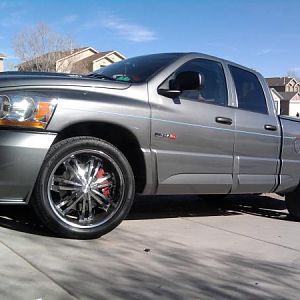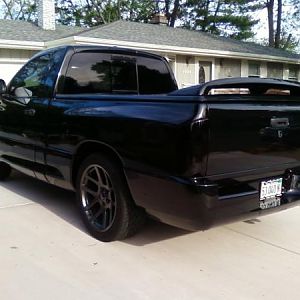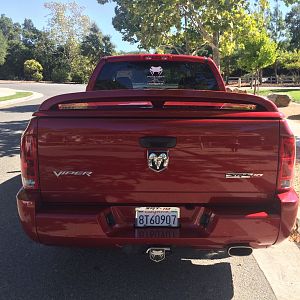So, the compression test results for the truck I’m looking at came back ranging from 142-154 in the cylinders. Is this good, bad, so so? I would think not great. Shouldn’t they all be within 5psi of each other. The shop also said there was a small coolant leak coming from the back of the engine but couldn’t tell where from. Thoughts on this?
You are using an out of date browser. It may not display this or other websites correctly.
You should upgrade or use an alternative browser.
You should upgrade or use an alternative browser.
Compression test results?
- Thread starter Aavt
- Start date
IronAffliction
Full Access Member
Coolant leak might be from the heads. Mine started leaking because the back two head bolts were loose. Easy fix. Not sure on the compression
mopar-or-no-car
Full Access Member
15% max between cylinders is allowable. This is a basic industry standard. I start to worry once 10%+ is reached.
Last edited:
VENOMOUS1 RACING
Has Left the Room - Banned from VTCOA!
They are low results period. Did they have TB open?
IronAffliction
Full Access Member
Just curious what should compression numbers be?
I’ll ask the shop and get back to you. Anything else to ask? I know they did it cold so that could effect it as wellThey are low results period. Did they have TB open?
VENOMOUS1 RACING
Has Left the Room - Banned from VTCOA!
Just curious what should compression numbers be?
In a good sealing engine 175-180 never less then 170 unless rings are worn and it'll be sustantially lower. Leakdown test is just as important !:rock:
Psycho1122
Full Access Member
This is from Page 5519/8410 of the OEM Service manual for our trucks...
CYLINDER COMPRESSION PRESSURE TEST
The results of a cylinder compression pressure test can be utilized to diagnose several engine malfunctions.
Ensure the battery is completely charged and the engine starter motor is in good operating condition. Otherwise the
indicated compression pressures may not be valid for diagnosis purposes.
1. Check engine oil level and add oil if necessary.
2. Drive the vehicle until engine reaches normal operating temperature. Select a route free from traffic and other
forms of congestion, observe all traffic laws, and accelerate through the gears several times briskly.
3. Remove the Auto Shut Down (ASD) relay from the Power Distribution Center (PDC).
4. Disconnect ignition cables from spark plugs.
5. Remove all spark plugs from engine. As spark plugs are being removed, check electrodes for abnormal firing
indicators fouled, hot, oily, etc. Record cylinder number of spark plug for future reference.
6. Be sure throttle blade is fully open during the compression check.
7. Insert compression gauge adaptor Special Tool 8116 or the equivalent, into the No. 1 spark plug hole in cylinder
head. Connect the 0-500 psi (Blue) pressure transducer (Special Tool CH7059) with cable adaptors to the scan
tool. For Special Tool identification, (Refer to 9 - ENGINE - SPECIAL TOOLS).
8. Crank engine until maximum pressure is reached on gauge. Record this pressure as No. 1 cylinder pressure.
9. Repeat the previous step for all remaining cylinders.
10. Compression should not be less than 689 kPa (100 psi) and not vary more than 25 percent from cylinder to
cylinder.
11. If one or more cylinders have abnormally low compression pressures, repeat the compression test.
12. If the same cylinder or cylinders repeat an abnormally low reading on the second compression test, it could
indicate the existence of a problem in the cylinder in question. The recommended compression pressures
are to be used only as a guide to diagnosing engine problems. An engine should not be disassembled
to determine the cause of low compression unless some malfunction is present.
So, it looks like your fine especially if it was performed cold.
Cheers
CYLINDER COMPRESSION PRESSURE TEST
The results of a cylinder compression pressure test can be utilized to diagnose several engine malfunctions.
Ensure the battery is completely charged and the engine starter motor is in good operating condition. Otherwise the
indicated compression pressures may not be valid for diagnosis purposes.
1. Check engine oil level and add oil if necessary.
2. Drive the vehicle until engine reaches normal operating temperature. Select a route free from traffic and other
forms of congestion, observe all traffic laws, and accelerate through the gears several times briskly.
3. Remove the Auto Shut Down (ASD) relay from the Power Distribution Center (PDC).
4. Disconnect ignition cables from spark plugs.
5. Remove all spark plugs from engine. As spark plugs are being removed, check electrodes for abnormal firing
indicators fouled, hot, oily, etc. Record cylinder number of spark plug for future reference.
6. Be sure throttle blade is fully open during the compression check.
7. Insert compression gauge adaptor Special Tool 8116 or the equivalent, into the No. 1 spark plug hole in cylinder
head. Connect the 0-500 psi (Blue) pressure transducer (Special Tool CH7059) with cable adaptors to the scan
tool. For Special Tool identification, (Refer to 9 - ENGINE - SPECIAL TOOLS).
8. Crank engine until maximum pressure is reached on gauge. Record this pressure as No. 1 cylinder pressure.
9. Repeat the previous step for all remaining cylinders.
10. Compression should not be less than 689 kPa (100 psi) and not vary more than 25 percent from cylinder to
cylinder.
11. If one or more cylinders have abnormally low compression pressures, repeat the compression test.
12. If the same cylinder or cylinders repeat an abnormally low reading on the second compression test, it could
indicate the existence of a problem in the cylinder in question. The recommended compression pressures
are to be used only as a guide to diagnosing engine problems. An engine should not be disassembled
to determine the cause of low compression unless some malfunction is present.
So, it looks like your fine especially if it was performed cold.
Cheers
So, the compression test results for the truck I’m looking at came back ranging from 142-154 in the cylinders. Is this good, bad, so so? I would think not great. Shouldn’t they all be within 5psi of each other. The shop also said there was a small coolant leak coming from the back of the engine but couldn’t tell where from. Thoughts on this?
depends on how they did the test, but sounds like you are in the range of all being the same, ive seen low an high readings, our gauges show 160-180 but have seen other gauges show low
mopar-or-no-car
Full Access Member
25% WOW. That is high MA Mopar. Shame on you 
VENOMOUS1 RACING
Has Left the Room - Banned from VTCOA!
25% WOW. That is high MA Mopar. Shame on you
And not less than 100 psi? Shit I hope not. It's obviously a generic spec they throw at all models because each car says the same thing in tech manual.
Super Dave
Full Access Member
175 psi
When inought my truck at 80,000 miles it tested 165-175 psi on all cylinders.
When inought my truck at 80,000 miles it tested 165-175 psi on all cylinders.
VENOMOUS1 RACING
Has Left the Room - Banned from VTCOA!
When inought my truck at 80,000 miles it tested 165-175 psi on all cylinders.
Exactly where it should be!:burnout:
Chuck B
Full Access Member
I've spent this summer/fall/winter doing some restoration on my 170K mile truck. New paint overall but lots of mechanical replacements. I've been collecting OEM new parts the last couple years as many of our suspension, water pumps, injectors etc are getting hard to come by. Just finished up the engine bay (last thing) and decided to do a compression check... Darn thing was 170-175psi across all the cylinders. It still doesn't burn any oil.
On a negative note; truck has an inconsistent idle now when cold. Once it warms up its rock steady. I had the intake manifold off to replace coils/wires. Did new injectors, valve cover gaskets, intake gaskets, water pump etc. First thought was intake leak, however, the design/gaskets used makes it almost idiot proof. Suggestions? Except for that one bolt pulling the intake isn't that big a deal.
On a negative note; truck has an inconsistent idle now when cold. Once it warms up its rock steady. I had the intake manifold off to replace coils/wires. Did new injectors, valve cover gaskets, intake gaskets, water pump etc. First thought was intake leak, however, the design/gaskets used makes it almost idiot proof. Suggestions? Except for that one bolt pulling the intake isn't that big a deal.
Psycho1122
Full Access Member
A few things if I may ask....
Nice Compression #'s!!
What oil / filter have you been using and how often do you change it? Also, how often do you start it?
When it comes to inconsistent idle, have you addressed your O2 sensors in the exhaust?
Cheers!
Nice Compression #'s!!
What oil / filter have you been using and how often do you change it? Also, how often do you start it?
When it comes to inconsistent idle, have you addressed your O2 sensors in the exhaust?
Cheers!
VENOMOUS1 RACING
Has Left the Room - Banned from VTCOA!
I agree, O2 sensors degrade and are often overlooked as part of an engine build or freshening. Assume you're running stock 438 Champion? If not we found your Miss 
Chuck B
Full Access Member
A few things if I may ask....
Nice Compression #'s!!
What oil / filter have you been using and how often do you change it? Also, how often do you start it?
When it comes to inconsistent idle, have you addressed your O2 sensors in the exhaust?
Cheers!
I was a bit surprised on the numbers myself. I've only used OEM specified oil (Mobile 0-40) and have changed it and OEM Viper oil filter religiously every 3000 miles. Thats about 55 oil changes!
While I was living in Flagstaff the last 6yrs I left the truck here in Phx. I took it out for a drive maybe once every couple months. Going back thru my records I've been averaging about 1500 miles a year. We are back in Phx now and now driving it once or twice a month.
O2 sensors...that was also part of my mechanical upgrades the last few months. I went with full Billy Boat exhaust with stock headers. Secondary O2's are connected to simulators. Running primary only and no cats. Truck ran fine before all the mechanical work I did.
Support Us
Become A Supporting Member Today!





